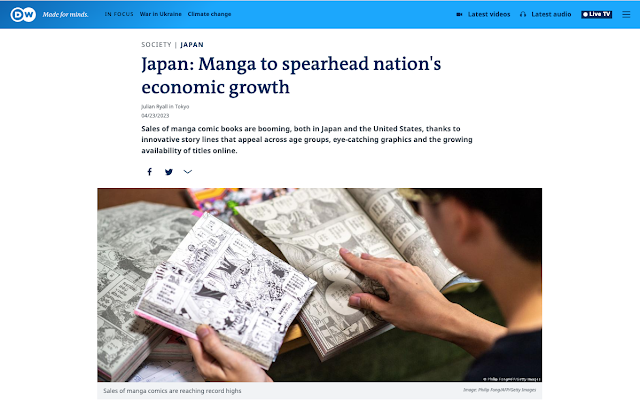DW interview on manga's explosive sales and Keidanren's money
Anime may be booming, but Japanese manga (comic book) sales are astronomical. I was interviewed about the explosive overseas sales of manga during the pandemic and the recent proposal by Keidanren, Japan's biggest business federation, to quadruple overseas manga sales over the next 10 years.
You can read Julian Ryall's full story here.
Excerpt: "'I was stunned when I saw the figures for 2020 and 2021, which showed that year-on-year manga sales in the US were up by 171%,' Kelts told DW. 'That's just an astonishing number, and the figures made it clear that the overall graphic novel market grew much faster than the standard market for books.'
There are key differences between the Japanese and US markets, however, with sales of print manga in North America driven in recent years by anime that consumers will have seen on television, including such famous titles as 'One Piece,' 'Attack on Titan,' and 'Spy Family,' Kelts highlighted. The situation is reversed in Japan, where series of print manga that are popular are made into anime.
According to Kelts, Japanese consumers have also been quicker to embrace online manga because North American homes are typically significantly larger than Japanese abodes, meaning they have more space to store large numbers of books.
Readers in Japan, on the other hand, used to treat manga as disposable and leave them on trains for other people to read. That no longer happens, as consumers now frequently read the latest instalment of their favorite manga on their mobile phones.
'Fifteen years ago, Japanese business leaders sneered at the idea that manga and anime could become an important export sector for Japan, but that generation has now retired and been replaced by people who 'get it' when it comes to manga,' Kelts said.
Keidanren chairman Masakazu Tokura is known to be a fan of anime and manga, and discussed the film adaptation of the basketball manga 'Slam Dunk' with South Korean President Yoon Suk-yeol during his recent visit to Tokyo.
'Tokura came of age during the 1970s and '80s, when manga were ubiquitous in Japan,’ Kelts pointed out. ‘In fact, domestic print sales peaked in the mid-'90s, so he and his cohorts have none of the prejudices against manga that their predecessors may have held.
'At present, Japan is the unchallenged world leader in anime and manga and Keidanren is right to get behind it as a driver of the economy.'"


.jpg)